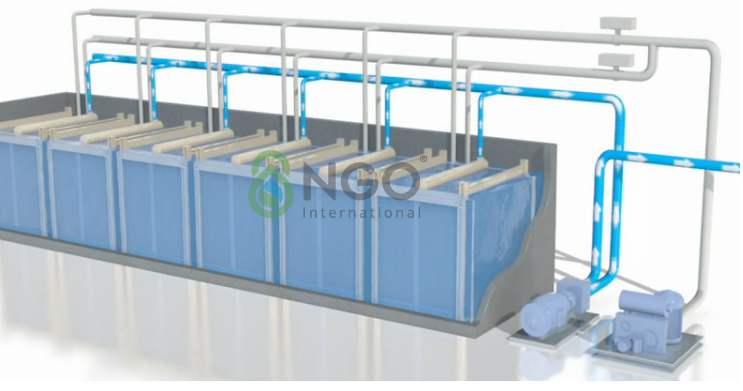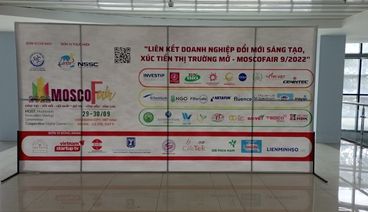WASTEWATER TREATMENT TECHNOLOGY (PART 1)

1. What is MBR bio-filter technology?
MBR is an advanced technology combining both biological and physical methods (biomass separation technique with MF/UF filter with pore size ranging from 0.1-0.4μm), successfully applied in the world in wastewater treatment since the 1980s.
Distinguish common filter technologies:
Membrane is understood as the barrier between semi-permeability (water flow and flow of dissolved substances), mainly due to pressure. The membrane acts as a filter, while the bio-filter takes place with the biochemical reactions performed by the microorganisms. Currently, there are four popular membrane technologies on the market: Microfiltration, Ultrafiltration, Nano filtration and reverse osmosis technology.
- Micro-filtration, also known as MF membranes, have a pore size of 0.1 µm, specialized for removing large particles. The MF membrane operates on the same principle as the reverse osmosis (RO) membrane under low pressure. MF membrane is widely applied in a number of fields such as fruit juice filtration, eliminating bacteria in water or treating wastewater, etc.
- Ultra-filtration or UF membranes have a pore size of 0.5 µm, capable of removing small impurities, removing grease, suspended solids, etc.
- Nano-filtration or NF membrane with pore size of 0.5 - 1 nm is capable of eliminating multivalent ions, almost viruses, natural organic substances and salts. NF film is applied to soften, eliminate toxins and remove colour in water treatment system.
- Reverse osmosis membranes or RO membranes with pore sizes <0.5 nm are commonly used in desalination and demineralization to produce pure water.
Read more about membrane types:
http://ngoenvironment.com/vn/Tin-tuc-n37-PHAN-BIET-CONG-NGHE-MANG-LOC-PHO-BIEN-d82.html
2. Operating principle of MBR membrane technology
MBR wastewater treatment technology is an advanced technology combining both biological methods and biomass separation techniques. Biological treatment process can combine from anaerobic, anoxic and aerobic stages depending on the requirements and the treatment of organic substances thoroughly through two nutrients (N, P).
Advantages of MBR bio-filter technology
- MBR works with long sludge retention time, high MLSS concentration, and low F / M ratio
- The quality of treated water does not depend on the sedimentation of the sludge.
- MBR has a higher nitrification process than the traditional activated sludge process because bacteria have more time to conduct nitrification (long SRT, low F / M).
- The floc size in MBR is small, allowing more metabolism of nutrients and oxygen.
- The presence of MBR membranes prevents the filtration of nitrifying microorganisms at short SRT and HRT.
- MBR produces less sludge
- MBR wastewater treatment system can handle higher pollutant load (2.5-3 times higher than CAS)
- Reduce the processing area of the whole system up to 50% compared to normal processes.
- Eliminate many process steps of CAS technology such as 2nd phase sedimentation, sludge collection or other measures to remove BOD, SS.
- Highly effective microbiological treatment, minimizing the risk of pollution, not using chemical disinfectants
- Consume less energy.
- Quality of outlet water meets A standard, can be reused for many purposes such as seafood, floor washing ...
- MBR has outstanding advantages compared to other wastewater treatment technologies in terms of treatment area.
Disadvantages of MBR technology
- Investment costs for initial wastewater treatment systems and operating costs are higher. If the membrane quality is not good, it may cause membrane clogging.
- Complex operating procedures for membrane cleaning, requiring skilled operators to operate the system without using an automatic cleaning step (either by aeration or by chemical liquids).
MBR bio-filter wastewater treatment technology can be applied to treat almost all types of wastewater for different constructions such as buildings, apartments, urban areas, commercial centres, hotels, hospitals, etc. MBR technology is particularly suitable for projects with a small area and need to reuse water for production.



